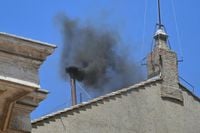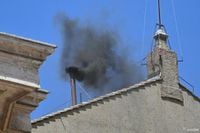In a historic moment for the Catholic Church, Cardinal Robert Francis Prevost has been elected as the new Pope, taking the name Leo XIV. The announcement, made from the central balcony of St. Peter's Basilica on May 8, 2025, marks a significant milestone as he becomes the first American-born pontiff in history. Thousands of faithful gathered in St. Peter's Square to celebrate this momentous occasion, welcoming the news with joy and enthusiasm.
The Protodeacon Cardinal announced, "Annuntio vobis gaudium magnum: Habemus Papam!" (I announce to you a great joy: We have a Pope!). Cardinal Prevost, 69, succeeds his predecessor and steps into his role as the 267th Roman Pontiff during a time of pressing global challenges facing the Church. His election is seen as a beacon of hope and expectation across five continents.
Born in Chicago to an English father and a Spanish mother, Prevost has spent the majority of his pastoral life in Peru, where he became a naturalized citizen. His background has led analysts to describe him as a unique blend of American pragmatism and the intimate pastoral approach typical of Latin American clergy. One analyst noted, "He is a highly regarded cardinal because he has very interesting qualities. Born in North America to a Spanish mother, he spent his entire life as a pastor in Peru, merging American pragmatism with the approach and intimacy of a pastor in Latin America."
Prevost's election has sparked discussions about the implications of an American Pope, especially given the United States' strong international political influence. However, many believe that his extensive experience in Peru has alleviated concerns about potential biases. CNN remarked, "There are many talks about avoiding an American-born person as Pope in the conclave due to the strong international political influence of the United States, but Prevost seems to have reduced such concerns because he has accumulated a long experience in Peru."
His commitment to social issues, particularly the plight of the poor and immigrants, aligns closely with the values of his predecessor, Pope Francis. Prevost has been noted for his dedication to serving marginalized communities, often stating that "a bishop should not become a petty king sitting in his own kingdom." This philosophy may resonate well with the Church's mission of compassion and outreach.
During his first appearance as Pope, Leo XIV addressed the crowd in both Italian and Spanish, wishing peace upon all. He emphasized the importance of building "bridges of dialogue" for peace and unity, reflecting his desire to foster inclusivity within the Church. He stated, "Therefore, we can all walk together," highlighting his vision for a united Christian community.
The new Pope's academic credentials are impressive. He earned a bachelor's degree in mathematics from Villanova University, a master's degree in theology from Chicago Catholic Theological University, and a doctorate in canon law from the Pontifical University of Saint Thomas Aquinas in Rome. After being ordained as a priest in 1982, he joined the Augustinian Order's mission in Peru, where he served for over two decades, eventually becoming a bishop.
Prevost's selection is viewed as unconventional, not only due to his American roots but also because he was relatively unknown to the general public prior to his election. This has led to a mix of excitement and curiosity about his leadership style and the direction he will take the Church. His introverted and cautious nature may influence his approach to the papacy, as he navigates the complexities of contemporary issues facing the global Church.
In a notable reaction, former U.S. President Donald Trump welcomed the election of the first American Pope on social media, expressing his excitement and pride. He stated, "How exciting it is and how much glory it is for our country," and expressed his eagerness to meet Pope Leo XIV, calling it a "very meaningful moment." This endorsement from a prominent political figure underscores the intersection of faith and politics in the current landscape.
As the Catholic Church embarks on this new chapter under Pope Leo XIV, many are hopeful that his leadership will address pressing social issues while fostering unity among believers. The global community will be watching closely to see how he navigates the challenges ahead and whether he can build upon the legacy of his predecessors.
With his unique background and commitment to service, Pope Leo XIV stands poised to make a significant impact on the Church and the world at large. His election not only reflects a changing landscape within the Vatican but also signals a potential shift in how the Church engages with contemporary issues.
The election of Pope Leo XIV is not just a milestone for the Catholic Church but also a moment of reflection on the future of faith in an increasingly complex world. As he begins his papacy, the faithful and observers alike are left to ponder what this new leader will bring to the Church and how he will respond to the myriad challenges facing the global Christian community.



